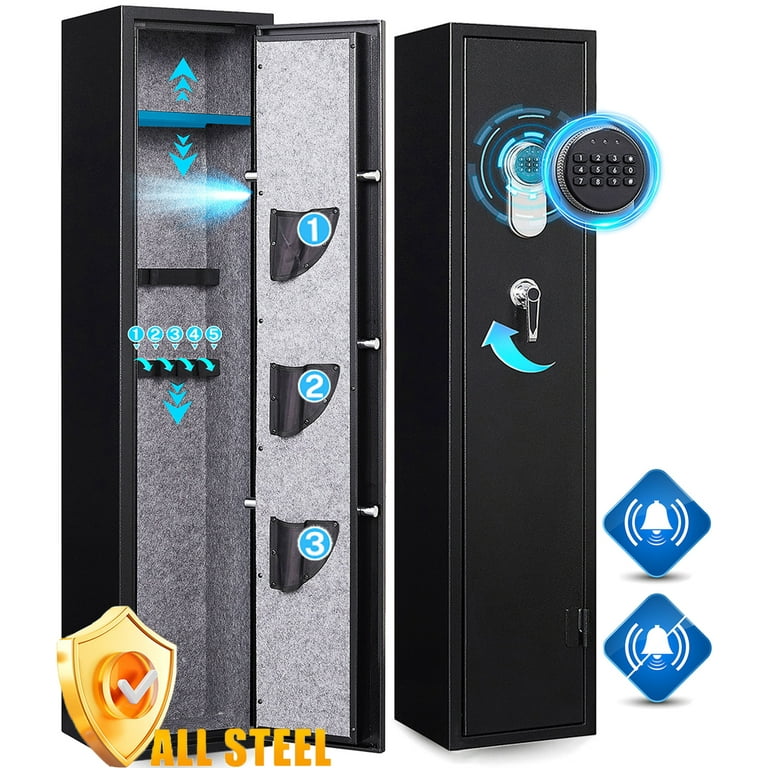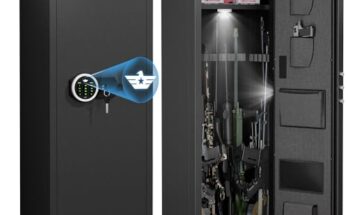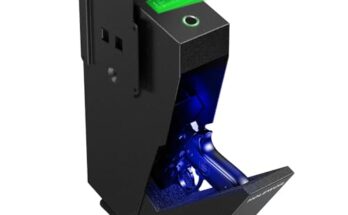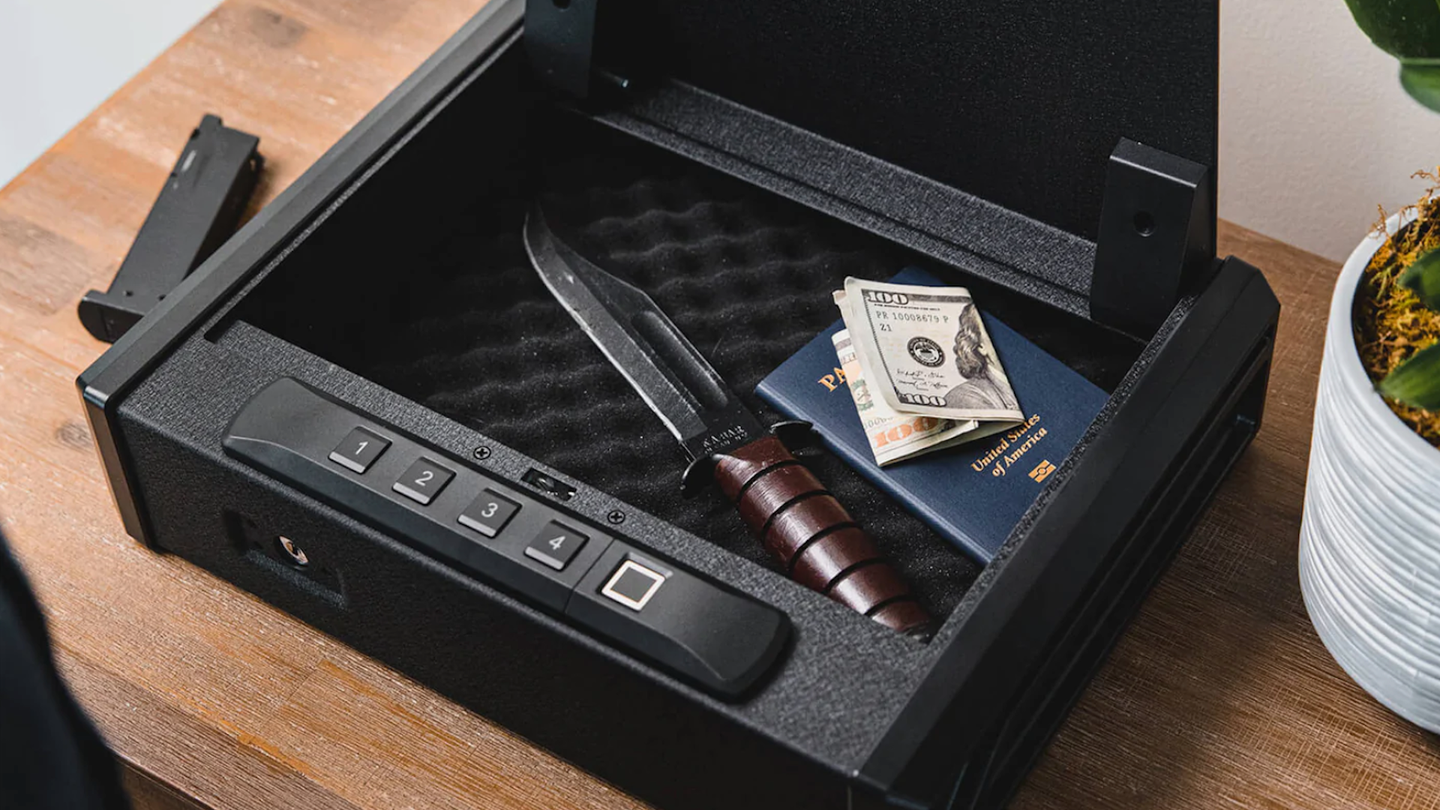It is generally okay to put a gun safe in the basement, but you must consider humidity and potential flooding risks. Ensure the safe is anchored securely to prevent theft or accidents.
Storing a gun safe in the basement can be a secure and out-of-the-way option for many homeowners. Gun safes require a stable, cool environment to protect firearms from corrosion and dampness. For those considering this storage solution, managing the basement’s moisture levels becomes a priority to avoid damage to both the safe and its contents.
Consequently, purchasing a dehumidifier might be a worthwhile investment. Equally important is safeguarding the safe against flood damage—evaluate your basement’s flood risk and install the safe in an elevated area if necessary. Always prioritize accessibility and safety while placing a gun safe to ensure it meets your security needs and maintains the condition of your firearms.
Selecting The Ideal Location For Gun Safes
Selecting the Ideal Location for Gun Safes is a critical decision for responsible gun owners. The location of a gun safe can have major implications for both security and safety. There are many places in the home where one might consider placing a gun safe, but the basement often surfaces as a potential spot. A deep dive into the pros and cons is essential.
Evaluating Accessibility
Easy access to guns in times of need is paramount for owners. The basement may offer privacy and security, yet it can pose accessibility issues. Consider the following:
- Proximity to your bedroom: How quickly can you reach the basement?
- House layout: Are there any obstacles that could slow you down?
- Lighting: Basements often lack natural light. Is the area well-lit?
Environmental Risks And Considerations
Basements can be prone to environmental challenges that could harm firearms. Key considerations include:
| Environmental Factor | Impact on Gun Safes | Preventive Measures |
|---|---|---|
| Moisture: | Increase in rust and corrosion of metal parts. | Use dehumidifiers and maintain regular inspections. |
| Temperature Fluctuations: | Possible damage to safe’s locking mechanism. | Insulate the safe and control the basement’s climate. |
| Flooding: | High risk of water damage to firearms and safe interior. | Install the safe above potential flood levels. |
Always evaluate your basement’s climate before placing a gun safe there. Act to mitigate risks. For example, choose a safe location away from pipes or potential water sources. Ensure the installation surface is level and the safe is bolted down.

Credit: www.walmart.com
Pros Of Positioning A Gun Safe In The Basement
Many gun owners worry about the best place to store their safes. The basement often arises as a potential spot. There are quite a few benefits to keeping a gun safe in the basement. Let’s explore three major pros of this location choice.
Enhanced Security From Theft
Basements can provide an extra layer of theft protection. Thieves often target bedrooms and offices first, not basements. A heavy safe is even more difficult to remove when it’s downstairs. This positioning can deter theft. Some basements also have fewer windows, which means less entry points for burglars.
Natural Disaster Resistance
Basements are underground and robust. This makes them less susceptible to natural disasters like fires or tornadoes. A gun safe in the basement might have better chances of surviving such events. Valuables inside the safe could stay protected.
Limiting Unauthorized Access
A safe downstairs can keep guns away from children and other family members. Basements often see less foot traffic, reducing the odds of curious hands finding the safe. Locking the basement door adds another barrier to unauthorized access.
Cons Of Basement Gun Safes
Storing your gun safe in the basement might seem like a smart move, but it comes with hidden drawbacks. Below, let’s explore the specific challenges that basement conditions present for gun safes, and why these cons might make you rethink your storage strategy.
Moisture And Humidity Challenges
Basements are notorious for their damp conditions, making them a breeding ground for moisture and humidity. High humidity can cause rust and corrosion, damaging the guns inside your safe. To combat this, you might need to invest in dehumidifiers or rust inhibitors, adding to your overall costs.
Potential Flooding Issues
In times of heavy rain or during the thaw of winter, your basement can become vulnerable to flooding. A flooded basement can submerge your gun safe, possibly damaging both the safe’s external and internal mechanisms, not to mention the firearms inside. Ensuring elevation and waterproofing measures for your safe might be necessary, yet inconvenient.
Difficulty In Retrieval During Emergencies
Easy access to your firearms can be crucial in emergencies. A basement location can significantly hinder rapid access. Navigating stairs and obstacles to reach your gun safe takes valuable time, which might not be ideal during high-stress situations.
Mitigating Risks In Basement Gun Storage
Storing guns in the basement can be smart. Basements often offer extra space away from household traffic. Yet, risks like humidity and flooding can harm guns or the safe. Smart steps can keep guns safe and dry.
Utilizing Dehumidifiers
Basements can get damp. This moisture can cause guns to rust. Dehumidifiers pull water from the air, keeping guns dry. Smaller dehumidifiers work for little spaces. Bigger ones might be needed for larger basements.
Elevating Safes To Prevent Water Damage
Flooding can happen fast. Water can ruin guns and safe electronics. Raising safes off the floor keeps them away from water. This can be done with blocks or a shelf. Make sure the safe stays balanced to prevent tipping.
Selecting Safes With Enhanced Security Features
Basement safes need to resist break-ins. Look for safes with thick steel and strong locks. Some safes also have alarms. Others link to home security systems. These features help protect against theft.
Best Practices For Gun Safe Maintenance
Storing a gun safely is critical for any gun owner. Understanding the best practices for gun safe maintenance ensures longevity and reliability. Whether placed in the basement or any other part of the home, these steps are vital for the care and upkeep of your gun safe.
Regular Inspection For Rust And Corrosion
Basements can be damp, which makes guns safes susceptible to rust and corrosion. A regular check-up can prevent irreversible damage. Be proactive with these actions:
- Use a dehumidifier to keep the air dry.
- Inspect the safe monthly for any signs of rust.
- Apply anti-corrosion products if necessary.
- Test the mechanical parts for smooth operation.
- Change batteries annually in electronic locks.
- Consult a professional if you notice any malfunctions.
- Ensuring all firearms are present and accounted for.
- Checking that accessories and ammunition are organized.
- Making sure the safe remains easily accessible in urgent situations.
Ensuring Mechanical And Electronic Lock Functionality
A gun safe that doesn’t lock properly is a risk. Perform these checks to maintain lock integrity:
Audit Of Inventory And Accessibility
A disorganized gun safe can lead to difficulty in emergencies. Regular audits are essential for:

Credit: www.be-safe.org
Legal Implications And Safety Compliance
Storing firearms in your home requires careful consideration. The basement, a common choice for many gun owners, must meet legal and safety requirements. This section explores the must-know aspects of keeping a gun safe in the basement.
Adhering To Local And Federal Regulations
Understanding the laws that govern firearm storage is critical. Different states have varying regulations regarding gun safety. Always check with your local law enforcement or legal counsel to ensure compliance with these rules. Neglecting such regulations can lead to severe penalties.
- Check state mandates for gun storage
- Ensure lock mechanisms meet federal standards
- Secure safe against unauthorized access
Responsibility For Safe Gun Storage
As a gun owner, you bear the responsibility of preventing access to unauthorized individuals. This includes securing firearms from minors and those who could pose a danger to themselves or others. A gun safe in the basement must be inaccessible to such individuals.
- Prevent minors’ access to firearms
- Mitigate the risk of theft or misuse
- Choose a safe location within the basement
Impact On Insurance And Liability
Proper gun storage can influence your homeowner’s insurance policy. It’s essential to inform your insurance provider if you keep guns in the basement. Adequate storage can reduce liability risks and possibly affect insurance premiums.
| Aspect | Impact |
|---|---|
| Insurance Policy | May provide coverage enhancements for secure storage |
| Liability Risks | Can decrease with demonstrable safe storage practices |
| Premium Costs | Might be favorably adjusted due to reduced risk |
Addressing legalities and safety measures when placing a gun safe in the basement is critical. Proper adherence ensures your peace of mind and keeps your household safe.

Credit: fortifiedestate.com
Frequently Asked Questions For Is It Okay To Put A Gun Safe In The Basement
Should You Put A Safe In The Basement?
Placing a safe in the basement is a common practice, but consider potential flood risks and humidity levels. Ensure it’s anchored securely to deter theft and protect against environmental damage. Prioritize accessibility and fire safety when choosing the location for your safe.
Where Should You Not Put A Gun Safe?
Avoid placing a gun safe in areas prone to moisture, visible from outside, near windows, or in high-traffic areas of your home. Choose a discreet, protected location to deter theft and ensure safety.
Is It A Bad Idea To Keep A Gun Safe In The Garage?
Keeping a gun safe in the garage is not recommended due to potential humidity, temperature fluctuations, and increased risk of theft. Opt for a more secure and climate-controlled indoor area.
Where Is The Safest Place To Put A Safe In Your Home?
The safest place for a safe in your home is on a solid surface, anchored to the floor, and hidden from plain view, such as in a closet, behind a secured false panel, or beneath heavy furniture. Avoid obvious spots like the master bedroom or living areas.
Conclusion
Securing firearms in your home is crucial, and the basement can be a viable option. Prioritize humidity control and security to safeguard your guns effectively. Regular maintenance will ensure your peace of mind. Always consult professionals for optimal placement and care of your gun safe.
Stay safe by choosing wisely.




